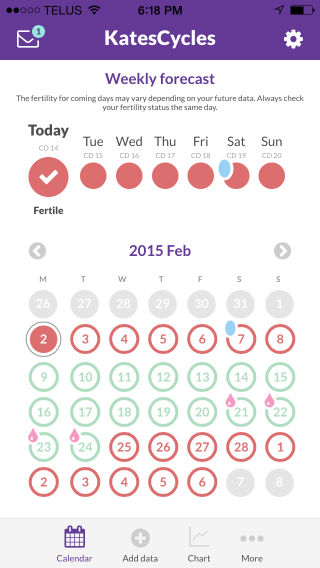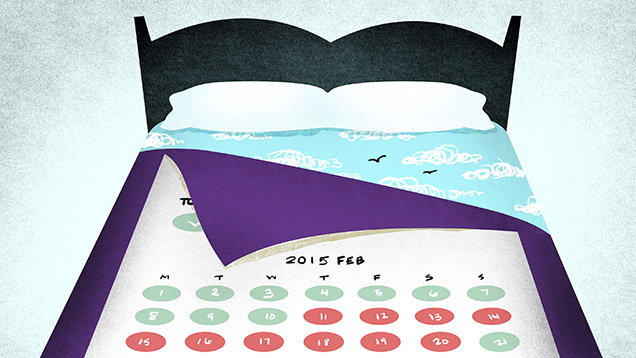I don’t need to tell you there’s no great birth control option right now. Hormonal contraceptives are like a carnival ride for your mood, IUDs are physical sperm-gates that need to be surgically shoved up your vaginal canal, and show me someone who tells you condoms feel good and I will show you a liar. That’s why the promise of hormone-free, noninvasive birth control with a smartphone app, crazy as it sounds, is so alluring. A Swedish app called NaturalCycles almost made me a believer.
Yes — it seems delusional to think that an app could offer the same level of pregnancy prevention as chemical or physical barriers. Our phones can pay for stuff and order taxis yada yada Steve Jobs, but circumventing biology is a tall order. NaturalCycles insists it’s possible; the company stats promise a sort of utopian birth control method: 100 per cent natural, 99.9 per cent safe. What’s less certain is if that’s 100 per cent true.
High-tech fertility awareness
I will grant NaturalCycles this: It has a pedigree that cultivates credibility. It was created by a former CERN physicist Elina Berglund, who passed on a prestigious career in physics to develop the app and its algorithm, which becomes more accurate as more women contribute data. It applies new technology to old-school fertility awareness, the natural pregnancy prevention approach of monitoring the body for signs of fertility.
The primary biomarker for fertility is basal body temperature: Women’s body temperatures fluctuate depending on where they are in their menstrual cycle, so changes can signal when you’re ovulating — and more to the point, when you aren’t.
The algorithm claims to tell users when it’s safe to have unprotected sex and when they should use protection as it tracks individual cycles. Women can also take LH tests to monitor for the presence of the luteinising hormone that crop up during ovulation. The app takes the data and uses it to assign “red days” and “green days” to a calendar so women can see the safest times to have unprotected sex. So it’s a birth control where you can have completely unprotected sex, but only on certain days.

I signed up for the free trial to test it out. The app is as straightforward and easy to use as it possibly could be. Since I didn’t actually go off birth control, it couldn’t give me an accurate read of when I’d be able to have unprotected sex, but the interface was clean and well-designed. It clearly marks when your red and green days are, though I’d be really worried about forgetting to take my temperature right when I woke up, which is necessary to make sure this works.
There are other apps that offer pregnancy prevention programs based primarily on temperature, like the fertility app Glow, which one of my lovely coworkers successfully used to get pregnant. Apps like Kindara tout the fertility method and their ability to track cycles as 99.4 per cent effective.
But NaturalCycles claims the highest success rate and, with its CERN scientist-credentials and learning algorithm, it has staked out an unparalleled claim to accuracy.
“We base our algorithm on all of the research that’s been done in the medical field. The research there is very established and old, that’s nothing new. What’s new that we do is with statistical mathematical tools. We do collaborate with professors and gynaecologists in Sweden,” Berglund told me via Skype.
Unlike some competing apps, NaturalCycles doesn’t require women to monitor the quality of their cervical mucus — something people do when using a more traditional approach to fertility awareness — because it claims the temperature-based algorithm is accurate enough on its own.
That app has 15,000 users at this point, primarily in northern Europe, the U.S., and Brazil. Berglund recently published a case study collaborating with the medical hospital Karolinska Instituet in the peer-reviewed European Journal of Contraception and Reproductive Health Care supporting the app’s bold 99.9 per cent success rate. The NaturalCycles team points to this study as evidence to back up its claims.
The case study is based on 300 user experiences. In that trial, there were no pregnancies reported for any women who only had unprotected sex on “green days.” There was only one pregnancy overall, and the woman who reported it had sex on a “red day,” ignoring the app’s recommended use. This is, of course, remarkable.
Too good to be true?
But it’s a small study, and one that had limited oversight. And it’s not one likely to sway gynaecologists into recommending fertility awareness apps as true alternates to methods like IUDs. I asked the American College of Obstetricians and Gynaecologists who I should contact to get a doctor’s take on the app and its claims and it hooked me up with Dr. Nathaniel DeNicola, an OBGYN at University of Pennsylvania.
“In general I think it’s great that we have so many apps available for women to track their fertility awareness,” DeNicola told me. He thinks doctors should bring these apps into the conversation about reproduction, though he’s sceptical about the claims that NaturalCycles makes. The “typical use” failure rate for the fertility awareness method of birth control is 25 per cent, according to DeNicola, the American Pregnancy Association, the Association of Reproductive Health Professionals, Planned Parenthood, and most available doctor-approved literature on the method.
“Nothing is inherently changing with women’s menstrual cycles, and nothing is changing in the way we know ovulation can vary. It’s hard to think that just doing it the phone will be a game-changer to that degree,” he said. “Think about the gap they have to close. You’re going from a less than 1 per cent pregnancy rate [with IUDs] to a 25 per cent pregnancy rate [with the fertility method]. That’s a pretty big gap to close just by recording temperatures on a mobile device, even with an algorithm. It’s unlikely that they’re going to reach the level of an IUD.”
So on one hand we have an app that is offering something enormously appealing to women: safe birth control that doesn’t require sticking hormones or copper things in your body or dealing with Trojans. On the other hand, the evidence is still limited, and flies in the face of conventional medical thought about the efficacy of fertility awareness. (And, of course, birth control apps do not prevent STDs.)
That it confounds conventional thinking on an old-school birth control method does not mean that NaturalCycles isn’t as accurate as it says it is. Women’s reproductive health has not, historically, enjoyed the most rigorous study, and up until recently, the most reliable method of birth control (the IUD) was not fairly considered by many U.S. OBGYNs, so it’s not like the medical community has a great history of immediately recognising superior forms of birth control when they’re presented.
The only way we’ll know for sure whether this app is as remarkably accurate as it claims to be is if more people use it and report the results to build a more comprehensive record of its success (or failure). Especially considering how many people may forget to take their temperature at the same time or have to skip days because of travel or sickness, it will be telling to see how a larger study that includes a bigger portion of less-than-perfect use cases turns up.
In the meantime, as much as I want to set my generic Ortho Tri-Cyclen on fire, and as much as the techno-progressive inside me wants to believe that an app could safely serve as my primary birth control, I’m apt to side with DeNicola here and remain sceptical that a fertility monitoring tool will ever prevent pregnancies with as low a fail rate as IUDs.
Illustration: Tara Jacoby
